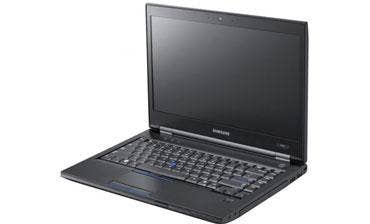Samsung Unveils Five Enterprise Laptops
As thin, light, powerful and stylish as Samsung's new Series 9 laptops might be -- and they are all those things -- there's one thing these ultraportable systems might never be: running something other than Windows. "We considered putting Android inside," said a Samsung spokesman at a launch event in New York City Wednesday, "but too many customers said they rely on Windows for applications and security. So we had no choice but to include a Microsoft operating system."
About the same size and weight as Apple's MacBook Air, and also clad in aluminum, is the 13-inch Series 9, which is built around a newer Intel Core i5 1.4 GHz processor with 4GB of DDR3 memory, 128GB solid state drive and 1366 x 768 pixel 400 nit LED-lit screen. List price $1699 with Win7Pro. Apple's $1299 13-inch MacBook Air includes a Core 2 Duo running Mac OS X 10.6 on 2GB memory (expandable to 4GB) and a 128GB SSD. Apple might have an edge with its GeForce 320M graphics versus Samsung's integrated Intel HD GT.
Beyond hardware parity, Samsung's customizations rival some of Apple's own, the best of which is a three-second wake-up time thanks to Samsung Fast Start, which also protects user state after a power loss or battery removal. After that, it's a toss up based on operating system preference. Both include lithium polymer batteries and WiFi b/g/n. Apple adds its MagSafe power connector.
Not unusual was the company's decision to move its new line starting today through Amazon, Best Buy and other box movers with Windows 7 Home Premium installed, and then fill the channel with systems running Windows 7 Professional; those systems will be available in mid-April.

Samsung unveiled a trio of new laptops with durability features it says are aimed squarely at enterprise users whose machines often take a beating, such as the frequent traveler and those in education. The new Series 2, Series 4 and Series 6 lines incorporate accelerometer-based hard drives that are shock-resistant, and pressure-resistant cases that Samsung claims can withstand a ton of pressure and as many as 26 drops from heights up to 30 inches.
Of course, we couldn't verify those claims at the launch event, but we in the CRN Test Center intend to put the company's rugged laptops to the test at the first opportunity. All cases feature durable metal hinges and are sealed to protect internal components from minor spills. Series 6 cases are constructed from magnesium alloy.
The versatile line is built around the latest Intel Core processors and Intel HD graphics, with NVIDIA Optimus as an option on some models. Series 4 and Series 6 units include fingerprint security sensors and TPM (trusted platform module) chips.
Here's where things get confusing. Series 2 machines are available with 12.5- and 14-inch displays with either 2GB or 4GB of memory. The 12.5-inch unit includes an Intel Celeron processor; the 14-inch model comes with an Intel Core i3. One hard drive size is available--320GB. So far, so good. The Series 4 too is available with 12.5- or 14-inch display, but its processor options include Core i3, i5 or i7 with 2MB or 4MB cache in the 12.5-inch model or 2MB to 6MB cache in 14-inch models. Available memory configurations are 2GB, 4GB or 6GB, and available HDDs are 320GB or 500GB 7200RPM ATA drives. Oh, and they can be ordered with either 32-bit or 64-bit Windows 7 Professional and the larger display includes the "SuperBright" 300 nit LED backlight. Still not too bad.
Then there's the Series 6, which comes in 14-inch (1366 x 768) or 15.6-inch (1600 x 900) display, both of which include the SuperBright LED backlight. Like the Series 4, processor options include Core i3, i5 or i7, but nemory starts at 4GB and is expandable to 8GB. SATA hard drive options are also the same as the Series 4 (320GB or 500GB), plus options for 128GB or 256GB SSDs. The Series 6 also offers an NVIDIA NVS 4200M graphics option to its Intel GMA HD default, as on all other units.
Samsung Series 2/4/6 laptops will begin shipping in April and will be covered by a three-year warranty with tier-2 support in the U.S.; pricing was not disclosed.